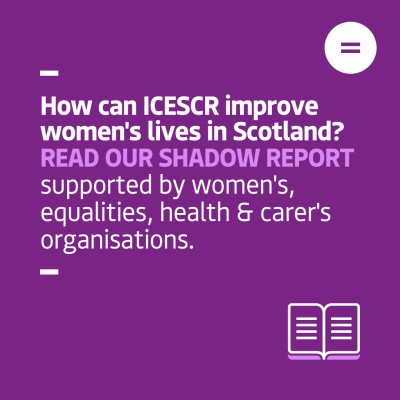Engender blog
How can ICESCR impact women's human rights in Scotland?

Engender recently joined with women's, equalities, health and carer's organisations to submit our shadow report to the Seventh periodic report of the government of the United Kingdom on measures taken to give effect to ICESCR. In this blog, we take a look at our submission and how ICESCR can be a key tool for improving women's lives in Scotland.
For many years, Engender and other women’s equality advocates have been campaigning for the incorporation of the UN Convention on the Elimination of all forms of Discrimination Against Women (often known as the ‘women’s bill of rights’) into Scots Law, but CEDAW isn’t the only UN Convention which is essential when it comes to the protection of women’s equality and rights. The International Covenant on Economic, Social and Cultural Rights (ICESCR), which ensures the enjoyment of economic, social and cultural rights, was adopted in 1966.
ICESCR interacts with women’s human rights in many ways. For example, it sets forth the rights to non-discrimination (article 2.2), to equal enjoyment of economic, social and cultural rights between men and women (article 3), to equal pay for equal work (article 7.a.i), and to special protection and benefits for childbirth (article 10.2). These are just a few examples, as gender cuts across all ICESCR rights.
The UK committed to protection of rights set out in ICESCR in 1976, and in 2021 submitted its most recent ‘state party report’ on progress under CESCR, which includes input from the Scottish Government on devolved matters. You can read the UK Government submission here. The CESCR committee will soon examine the UK Government (and Scottish Government) on this report at a ‘pre-sessional working group’ in Geneva.
Ahead of this, Engender has submitted a ‘shadow report’, covering the breadth of women’s rights issues and suggesting questions for the committee to ask during their examination. Our report was supported and signed by 18 other organisations, including women’s, equalities, health and carers organisations across Scotland.
The UK is subject to an escalating ‘cost of living crisis’ that will cause untold harm for women in Scotland, with disabled women, BME women, younger and older women, lone parents, unpaid carers and women with insecure immigration status at even greater risk of deeper poverty and destitution. The Covid-19 pandemic has also had a disproportionate and severe impact on women’s incomes, caring roles, physical security and mental health in Scotland, with ramifications still very much unclear. The cost of living crisis and ongoing impacts of Covid-19 and austerity are cross-cutting themes throughout our shadow report, and we draw attention to the particular impact of these on groups facing intersecting marginalisation.
In our submission, we suggest a number of questions for the Committee related to legal reform, policy implementation and policy change needed to protect and enable human rights for women and girls across a range of issues, including:
- Incorporating ICESCR into Scots Law as part of the new Scottish Human Rights Bill
- Building competence in gender mainstreaming and developing gender mainstreaming strategy
- Implementing intersectional gender budget analysis
- Ensuring the review of the Scottish Specific Duties of PSED works for women
- Building sustainable funding for violence against women services
- Implementing the Domestic Abuse (Protection) Act and establishing a leaver’s fund for women experiencing abuse
- Tackling high rates of violence against disabled women and girls
- Addressing sexual harassment in the workplace and as a health and safety issue
- Improving access to justice for all victim-survivors of domestic abuse
- Ensuring that design and implementation of the National Care Services advances women’s rights and equality
- Tackling the gendered barriers to women’s labour market equality
- Providing universal access to quality and flexible childcare
- Uprating social security entitlements, including the Scottish Child Payment
- Expanding access to the Scottish Welfare fund for unpaid carers
- Introducing a Real Living Wage for unpaid carers as part of the Scottish Carer’s Assistance
- Abolishing non-residential social care charging
- Enabling the delivery of automatic individual payments of Universal Credit
- Ensuring housing and homelessness systems meet the needs of diverse groups of women
- Decriminalising abortion in Scotland and ensuring equality of access to NHS abortion services for marginalised groups
- Expanding the Women’s Health Plan to incorporate non-sex-specific health inequalities
- Responding to the growing crisis in women’s and girls’ mental health
- Tackling sexual harassment and misogynist behaviour in schools
- Providing funding to tackle gender inequality in media and culture
You can read our shadow report and see a full list of the supporting organisations here.
Share this post on …
Comments: 0 (Add)
Sign up to our mailing list
Receive key feminist updates direct to your inbox:
